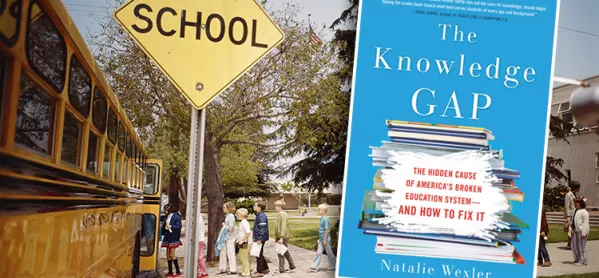- Home
- Book review: The Knowledge Gap
Book review: The Knowledge Gap

The Knowledge Gap: The hidden cause of America’s broken education system - and how to fix it
Author: Natalie Wexler
Publisher: Avery Publishing Group
Details: £22.23, 316pp
ISBN: 978-0735213555
High-stakes accountability is causing anxiety among teachers and students. Subjects other than maths and English are being cut from the curriculum because they aren’t tested.
Professional-development gurus tell teachers that, if children aren’t succeeding, it’s the teachers’ fault for not having high enough expectations. And teachers and educationalists are fervently debating the value of knowledge in the curriculum in a post-truth world. Recognise anything?
Natalie Wexler’s book The Knowledge Gap is a history of recent US education reform, but many of its issues will be uncannily familiar to UK readers.
Familiar issues in education
So too will the classroom vignettes that are dotted throughout the chapters. In one lesson Wexler observes, pupils learn about captions by writing their own beneath a picture of a goat. One pupil spells goat “goll”. Another complains that’s not how it’s spelled. The teacher intervenes and says: “That’s OK. That’s how he spells ‘goat’.”
Contrast that with a lesson Wexler observes where the class are following the core knowledge curriculum. The teacher reads pupils a passage about mummies in ancient Egypt, and the first question a pupil has is: “So, how do the mummies run?”
The teacher responds: “What you see on TV about people who come back to life - that’s made up. That’s fiction. We’re studying about what really happened.”
Dead white men
Critics of knowledge-based curricula often complain about how they privilege dead white men, and minimise the roles of marginalised groups.
But that’s to ignore two things. One: the way to deal with these issues is to correct the bias in the curriculum, not to remove knowledge from the curriculum. Two: a lot of the value of a knowledge-based curriculum comes from far less controversial, but still vital, issues: from telling pupils that “goat” is not spelled “goll”, that mummies don’t come back to life and place curses on people, and from establishing the valuable principle that neither your own instincts nor Hollywood films are a reliable guide to the world.
The great irony here, of course, is that the “that’s how he spells ‘goat’” type of relativism has largely been promoted by education academics on the left - but, in the US, its beneficiary has been the very unacademic and unleft Donald Trump, whose “alternative facts” could have come straight out of a post-modernist textbook.
More practically, many politicians and school administrators are wary of knowledge-based curricula not because of a high-minded commitment to philosophical relativism, but rather because of the daunting prospect of getting agreement about what knowledge should be taught.
A knowledge-based curriculum?
Wexler has bad and good news here. Yes, it can be hard to get people to agree, and often the arguments are toxic, ideological and performative. For example, in 1994, Lynne Cheney scuppered a genuinely bipartisan attempt to create a US history curriculum, in order to boost her husband Dick Cheney’s standing with US ultra-conservatives.
However, the good news is that agreement is possible. The latest advanced-placement US history curriculum did cause disagreements, but they were eventually resolved.
Under the leadership of John King, who went on to become Barack Obama’s education secretary, New York State developed the EngageNY curriculum, an open set of resources that teachers were free to download and adapt. This combination of top-down and bottom-up development is probably what is needed to improve education. Big institutions have the capacity to produce high-quality resources, but only teachers have the knowledge of their pupils to make the resources sing in the classroom.
Wexler tours a range of promising developments in New York, Washington DC, Nevada and Louisiana, which have the potential to bring about this change. For UK readers, some of these developments are relevant, although others depend a bit too much on understanding the minutiae of the US’ Common Core curriculum.
Teacher professional development
Wexler also shows the importance of high-quality professional development, not just resources. At one training session, the organisers proudly display examples of perfect pupil work. A teacher agrees that the writing is wonderful, but says that she is unable to get her pupils to achieve such a standard, even though she religiously follows the professional-development precepts. The organiser bluntly tells her that this is because she doesn’t have high enough expectations of her pupils.
But, as Wexler says, perhaps the issue is not teachers who lack high expectations, but professional-development programmes that lack a solid evidence base. The high-expectations mantra, while seemingly so uplifting, can become a way of blaming teachers for the failures of policymakers, administrators and educationalists. Indeed, it can even be a way of blaming disadvantaged pupils. As another character in the book says, discovery-based learning “creates situations in which students ultimately find themselves held accountable for knowing a set of rules about which no one has ever directly informed them”.
Is it possible to create a more inclusive and fairer education system? The Knowledge Gap shows the way.
Daisy Christodoulou is director of education at No More Marking and the author of Making Good Progress? and Seven Myths About Education. She tweets @daisychristo
You can support us by clicking the title link: we may earn a commission from Amazon on any purchase you make, at no extra cost to you.
Keep reading for just £1 per month
You've reached your limit of free articles this month. Subscribe for £1 per month for three months and get:
- Unlimited access to all Tes magazine content
- Exclusive subscriber-only stories
- Award-winning email newsletters



